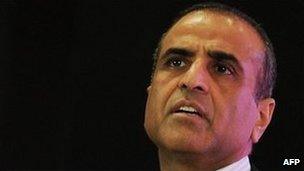Davos 2013: Africa must 'boost infrastructure spending'
- Published

Sunil Bharti Mittal said African governments should "go for broke"
Insufficient infrastructure spending remains "the biggest risk" to Africa's economic growth, the boss of mobile phone network Bharti Airtel, has said.
Speaking at the World Economic Forum in Davos, Switzerland, Sunil Bharti Mittal said African governments should spend as much as possible on infrastructure.
Graham Mackay, chairman of brewer SAB Miller, added that such spending was trailing Africa's economic growth.
He said it was resulting in "bottlenecks" for businesses.
'Go for broke'
Mr Mittal's mobile phone network is one of the largest in Africa, now operating in more than 15 African countries.
"Africa is a very large continent that [still needs] a lot of investment in infrastructure," Mr Mittal said. "That is to my mind the biggest risk to Africa's [economic] growth.
"Governments should go for broke, and get as much infrastructure built as possible. Can you imagine if Africa was to start investing heavily in infrastructure?"
Despite, his concerns, Mr Mittal said some countries were performing strongly in regard to their spending on infrastructure, covering everything from electricity generation and distribution, to road building and provision of fresh water.
He highlighted Ghana, Rwanda and "pockets of " Nigeria for praise.
UK-based brewing group SAB Miller traces its origins back to South Africa, and it remains the largest brewer in the country.
Mr Mackay said: "Are Africa's infrastructure investments keeping up with its economic growth? I would say no.
"On balance the infrastructure deficit is widening rather than narrowing."
He added that his company often had to make "heroic endeavours" to get things done in certain countries.
Goodluck Jonathan, President of Nigeria, said that while the infrastructure gap in Africa was "significant", countries across the continent were continuing to take action to improve the situation.